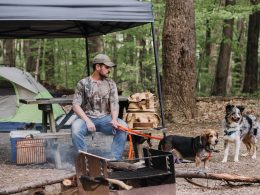When deciding if you want to take the plunge into full-time RV living, one of the things to consider is the health of your marriage. Finances, minimal living, and schooling are important factors, but moving into a small space can make or break your marriage and cause RVers marital problems.
So are full-time RVers more likely to suffer from marital problems? Let’s dive in!
What’s the Difference Between a Full-Time RVer and a Weekend Warrior?
When it comes to questions about marriage and family relationships, there’s a big difference between full-time RVers and weekend warriors. Full-time RVers live and travel full-time in their rigs. This means very little personal time, more repairs and issues, and added stressors during travel days.
On the other hand, weekend warriors head out to the local campground on Fridays after work and return home on Sunday afternoons. Since their time is much more limited in a tiny space, and they’re not moving as frequently, they tend to not have the challenges that full-time RVing couples have.
HOT TIP
Check out these #CoupleGoals who we think are the 10 Coolest Couples Who RV.

Are Full-Time RVers More Likely to Suffer From Marital Problems?
Although many people think it’s likely that full-time RVers will have more marital problems, this isn’t necessarily the case. In general, if you had problems before moving into an RV, you’ll most likely have the same problems once you’re on the road.
If you constantly argued about how to spend money while in a sticks-and-bricks house, that’s probably going to continue. Often, problems grow bigger once you move into an RV because of the small space.
There will also be new problems that will arise, like where to spend the holidays or how to find personal time. How RVers deal with these new challenges will be key in strengthening or weakening their marriage. But to say that full-timers are more likely to suffer from marital problems isn’t true.
They have to be diligent about communicating with each other and showing patience and grace with each other. RVing could bring them closer together rather than pushing them further apart.

What Are the Benefits of Full-Time RVing With Your Spouse?
There are huge benefits to full-time RVing with your spouse. You spend much more time together, making memories that will last a lifetime. You also learn communication skills to maintain harmony in a small space.
Quality Time Together
When spouses work full-time, there might only be two or three hours during the work week that they get to spend together. And often, these hours are spent cooking, eating, watching tv, taking the kids to and from sports practices, and so on. Very little time is usually together.
Full-time RVing changes that. There’s no leaving for work or running the kids around town. You’re in a small space constantly together. This has its challenges, but it also has its perks.
You have the chance to have meaningful conversations. You get to share your dreams of traveling together. Priorities shift so you can focus more on each other than prior responsibilities.
Improve Communication
To live together in a small space, you have to learn how to communicate effectively. Things can’t fester. When one spouse is upset and giving the cold shoulder treatment, there’s no space to “run away” from the problem.
Spouses learn to communicate when full-time RVing because they have to. Without this skill, the dream of traveling the country quickly turns into a nightmare.
New Adventures Together
Finally, part of spending quality time together is sharing new adventures. You get to go kayaking, hiking, biking, and exploring with the person you love most. You get to take selfies at the Grand Canyon and marvel at the majesty of Glacier National Park.
There are different cuisines to savor and lots of laughter around the campfire. Having this much fun with your spouse makes full-time RVing worth it.

What Are the Struggles of Full-Time RVing With Your Spouse?
However, it would be naive to think there aren’t challenges to full-time RVing. As mentioned earlier, the small space and constant interaction can wreak havoc on a marriage or bring you closer together.
Same Problems, Different Environment
When you move out of a sticks-and-bricks house, you don’t leave your problems behind. Whatever you brought with you into an RV will still be there. If you harbor grudges easily, that habit isn’t going to disappear.
If you tend to be selfish, you won’t suddenly start thinking of others. It’s a new environment, but the same problems and harmful habits you had before will still be there.
No Private Space
Because RVs are so small, there’s very little privacy. In the case of a traveling couple, they may have a bedroom, a kitchen, and a living space. If a wife wants to retreat to a reading nook, there are very few options. If a husband gets upset and needs to blow off steam, there’s no “man cave.”
This is when communication becomes so important. If you recognize that your spouse needs some alone time, offer to get out of the RV for a while or suggest the other person go for a quiet walk. As mentioned earlier, this tiny living will either strengthen your marriage or destroy it.
New Challenges and Stressors
Not only do you have the past problems of harmful habits or push-button topics, but you’ll also discover new stressors. Travel days are full of challenges, from navigating safe routes to fixing flat tires to getting stuck in traffic. Some RVs are known to be made poorly, so things may break.
New challenges of being a handyman or paying a mobile technician will constantly be rearing their ugly heads. How you deal with these new problems will be key to your overall happiness and marital relationship.
How to Love Life on the Road With Your Spouse
Some tips for living on the road with your spouse include effectively communicating, recognizing personal space, respecting privacy, and showing patience and grace.
As mentioned above, living full-time in an RV successfully will be challenging if you don’t communicate well with your spouse. Your time won’t be enjoyable because you’ll be bickering, harboring grudges, or giving the silent treatment.
Secondly, an RV is a tiny space. If you don’t respect personal space and privacy, you’ll irritate your spouse. There are times when you need to be alone just to clear your head, meditate, read a book, or listen to music. Don’t take it personally if your spouse asks to be alone for a while.
Finally, how you respond to challenges is crucial to life on the road. As much as possible, show patience and grace with your spouse. Times are going to be hard. You may have to make difficult decisions and unexpectedly altered plans. Enjoy the good times and memorable moments but be prepared with love to handle the struggles of RV life.
RVing Will Change Your Marriage, For Better or For Worse
Don’t let fear keep you from considering the RV lifestyle. If your marriage is healthy and strong, there’s no reason to think it won’t remain healthy and strong when you move into an RV. However, if you’re already struggling to get along, it’s worth considering whether or not this is a move you want to make.
Living in a small space will exacerbate those issues, so it might be best to deal with your harmful habits before taking the plunge into full-time RV living.
How do you and your spouse deal with challenges when they arise?
If You Love RVing, You Need to Stay Informed
Don’t rely on biased RV industry news sources to keep you informed with RVing news.
Stick with Nomadic News. We publish daily articles and breaking stories that matter to your RV lifestyle.










